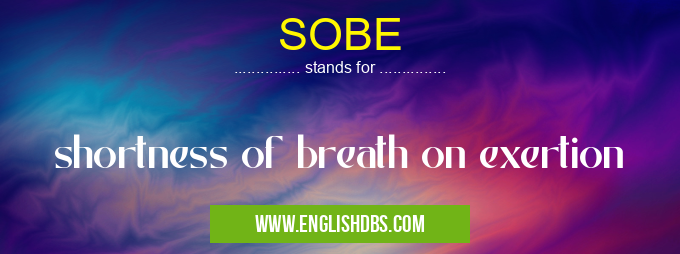What does SOBE mean in PHYSIOLOGY
Shortness of breath, also known as dyspnea, is the feeling of not being able to get enough air and feeling out of breath. This symptom is common in many medical conditions and can be a sign of an underlying issue that needs to be addressed. Shortness of Breath on Exertion (SOBE) is a specific type of shortness of breath in which symptoms worsen with physical activity or exertion. This type of shortness of breath is due to reduced oxygen availability while performing physical activities and often results from a cardiovascular, pulmonary, or musculoskeletal problem.

SOBE meaning in Physiology in Medical
SOBE mostly used in an acronym Physiology in Category Medical that means shortness of breath on exertion
Shorthand: SOBE,
Full Form: shortness of breath on exertion
For more information of "shortness of breath on exertion", see the section below.
» Medical » Physiology
SOBE Full Form
The full form for SOBE is “Shortness Of Breath on Exertion”.
Diagnosing SOBE
In order to diagnose SOBE, healthcare providers may perform a variety of tests looking for any underlying health condition associated with your symptoms such as cardiac stress tests or imaging studies like X-rays or CT scans if needed. Additionally, pulmonary function tests may be ordered in order measure how well you are able to move air in your lungs before and after exercise depending on what other signs/symptoms you are experiencing consistent with COPD/asthma.
Treatment Options for SOBE
Treatment options for SOBE depend on the underlying cause identified by your healthcare provider after diagnosis is made. Common treatments include lifestyle changes such as avoiding triggers if asthma is diagnosed, dietary changes if there is an additional weight related component identified, medications such as inhalers used for asthma control, supplemental oxygen therapy if you have very low levels during activity testing,and/or cardiac medications that help improve blood flow through vessels.
Essential Questions and Answers on shortness of breath on exertion in "MEDICAL»PHYSIOLOGY"
What is shortness of breath on exertion (SOBE)?
Shortness of breath on exertion (SOBE) is a condition in which you experience difficulty breathing during physical activity, such as running or even walking up stairs. It can range from mild to severe and it may be accompanied by chest pain and fatigue.
What causes SOBE?
SOBE is often caused by conditions that limit the amount of oxygen available to your lungs such as asthma or COPD. Other potential causes include heart disease, anemia, airway obstruction due to a foreign body or tumor, pulmonary embolism, pleural effusion, pulmonary edema, or exercise-induced bronchoconstriction.
How is SOBE diagnosed?
To diagnose SOBE, your healthcare provider will take a detailed medical history and conduct a physical exam. They may also order tests like chest x-rays or pulmonary function tests to help further assess the cause of the symptoms.
How can I manage my SOBE?
There are several ways you can manage your SOBE including quitting smoking if you're a smoker, avoiding air pollution/allergens if they trigger symptoms, getting regular physical activity that challenges but doesn't overexert you, seeking treatment for any underlying health conditions that can contribute to SOBE like asthma and COPD, and making sure to get enough rest.
Is there medication available for treating SOBE?
Yes! Your healthcare provider may prescribe medications like bronchodilators and anti-inflammatory drugs depending on the severity of your symptoms and what’s causing them. They may also recommend lifestyle changes such as avoiding certain activities that exacerbate your symptoms in addition to using medications for controlling them.
What other treatments might be recommended?
Depending on the cause of your shortness of breath on exertion (SOBE), other treatments might include surgery if an underlying condition needs to be addressed or physical therapy for those with exercise limitations due to their condition. Oxygen therapy might also be recommended in some cases where additional oxygen is needed during exercise or other physical activities.
Are there any home remedies I can use to reduce my SOBE?
While home remedies are not likely the primary method used for managing shortness of breath associated with exertion (SOBE), there are certain things which could potentially help improve symptoms such as drinking plenty of fluids/water throughout the day in order to thin mucus secretions; using room humidifiers; taking hot showers; avoiding allergens; performing breathing/relaxation exercises; avoiding exposure to extreme temperatures; sleeping with head elevated; using salt water gargles when mouth/ throat irritation occurs; having adequate hydration levels prior to exercising; gradually increasing intensity/duration when exercising rather than trying too much too quickly; etc...
Can I still exercise if I have SOBE?
Yes! Regular physical activity is important for overall health but when living with shortness of breath associated with exertion (SOBE) it’s important that activities are chosen carefully so as not to overexert yourself and make your symptoms worse. Talk with your doctor about developing an appropriate workout plan tailored specifically for you.
Final Words:
Shortness Of Breath On Exertion (SOBE) is a condition characterized by difficulty breathing during physical activity due to reduced oxygen levels either from cardiovascular problems such as coronary artery disease or from conditions like asthma and COPD affecting your ability to move air within your lungs while engaged in exercise. Diagnosis requires evaluation done by healthcare professionals based on clinical history, physical examination findings, further testing as needed,and treatment options vary depending upon individual diagnosis.It’s important to seek consultation immediately if you experience shortness of breath during exercise so it can be evaluated promptly.
